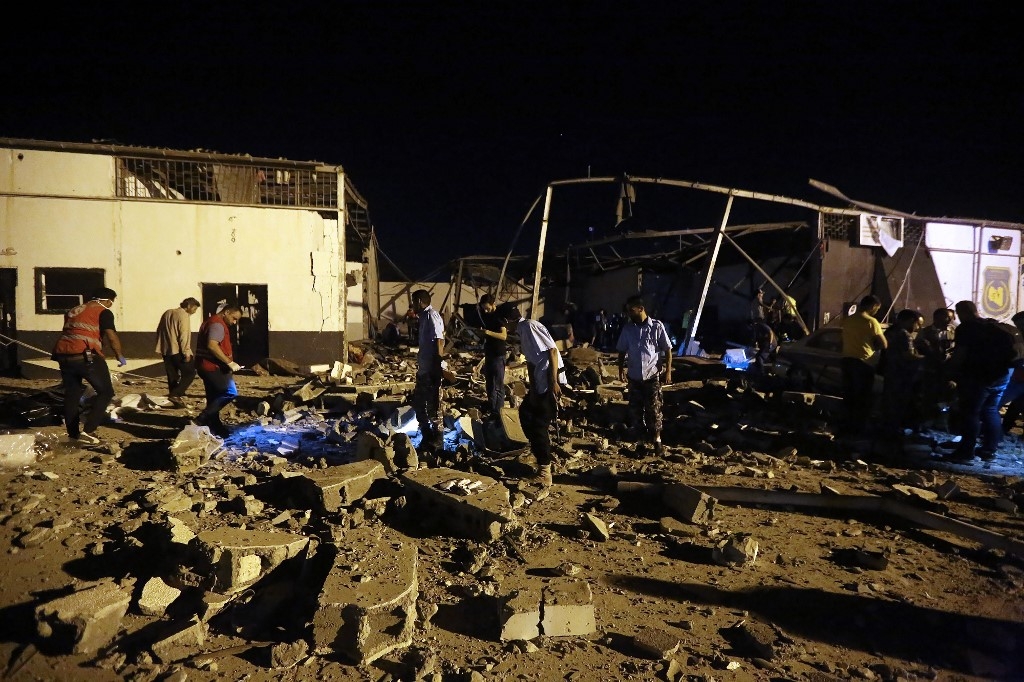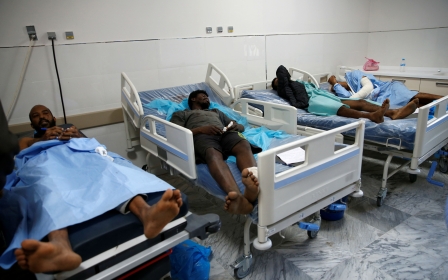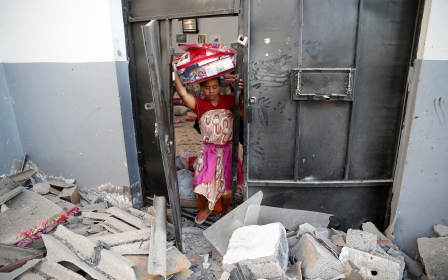EU says refugee detention centres in Libya should be closed

A European Union spokesperson has called for the closure of migrant detention centres in Libya, just days after an air strike killed at least 53 asylum seekers in the capital Tripoli.
“Our position is very clear. The conditions in which migrants are held in detention centres are unacceptable and detention centres should be closed,” EU spokesperson Maja Kocijancic told Middle East Eye on Friday.
The EU statement comes a day after Libyan Minister of Interior Fathi Bashagha said his government was considering closing all detention centres and evacuating those held inside to safety as the only available means to protect them from air strikes.
In a post on Facebook, Bashagha, who serves with the UN-recognised Government of National Accord (GNA) based in Tripoli, said that preventing air strikes is “beyond the ability” of his government.
Kocijancic said the EU would welcome any action that would move in the direction of closing the notorious shelters “as long as it respects the rights of migrants and refugees".
New MEE newsletter: Jerusalem Dispatch
Sign up to get the latest insights and analysis on Israel-Palestine, alongside Turkey Unpacked and other MEE newsletters
“We seek to evacuate refugees and migrants from the detention centres, and enable them to find safety outside of Libya,” she told MEE.
According to the UN, nearly 6,000 migrants and asylum seekers are held in Libyan detention centres, including over 3,000 at risk of being targeted in the Tripoli fighting.
Federica Mogherini, the EU’s chief diplomat, said in April that Brussels had been working with the UN's International Organisation for Migration and the UN refugee agency to evacuate the detainees outside Libya, or to move them to safer places inside Libya.
Claudia Gazzini, Libya expert at the International Crisis Group, said the fact that the EU as an institution supports the closure of detention centres comes as no surprise, but that individual countries may object.
Italy, for example, while supporting the closure of detention centres from a humanitarian point of view, will remain concerned about a sudden influx of migrants into the country, she said.
"It has been an ongoing request by the UN and EU as institutions, but the concern is what will happen to the migrants and whether they will attempt to cross the Mediterranean," she told MEE.
Strike in May near detention centre
The GNA has blamed Tuesday’s air strike on the self-styled Libyan National Army (LNA), led by eastern commander Khalifa Haftar, who launched an offensive in an attempt to seize Tripoli in April.
The LNA, allied to the House of Representatives, a parallel government in the east, had said on Monday it would start bombarding targets in the capital after "traditional means" of war had proved unsuccessful.
But an LNA official denied that their forces had hit the detention centre, saying militias allied to Tripoli had shelled it after a precision air strike by the LNA on a nearby military camp.
Tuesday's attack occurred in Tajura, a Tripoli suburb which is home to several military camps allied to the GNA that have been targeted by air strikes for weeks.
The UN refugee agency had already called in May for the detention centre to be evacuated after a projectile landed less than 100 metres away, injuring two people.
Libya is a main departure point for people fleeing poverty and war, trying to reach the European Union. In an effort to stem the numbers crossing the Mediterranean, the EU provides funds to the Libyan Coast Guard, which routinely sends asylum seekers to detention centres after rescuing them or intercepting their journeys.
Human Rights Watch has accused the EU of contributing to the abuse of asylum seekers in Libya through its support to the Libyan Coast Guard.
Thousands of people are held in government-run detention centres in western Libya in what human rights groups and the UN say are often inhumane conditions.
The fighting between the GNA-allied forces and the LNA has scuppered UN plans for an election to end rivalries between parallel administrations in the east and west.
The conflict is part of the chaos in the oil-and-gas-producing nation since the NATO-backed overthrow of Muammar Gaddafi in 2011.
Middle East Eye delivers independent and unrivalled coverage and analysis of the Middle East, North Africa and beyond. To learn more about republishing this content and the associated fees, please fill out this form. More about MEE can be found here.




